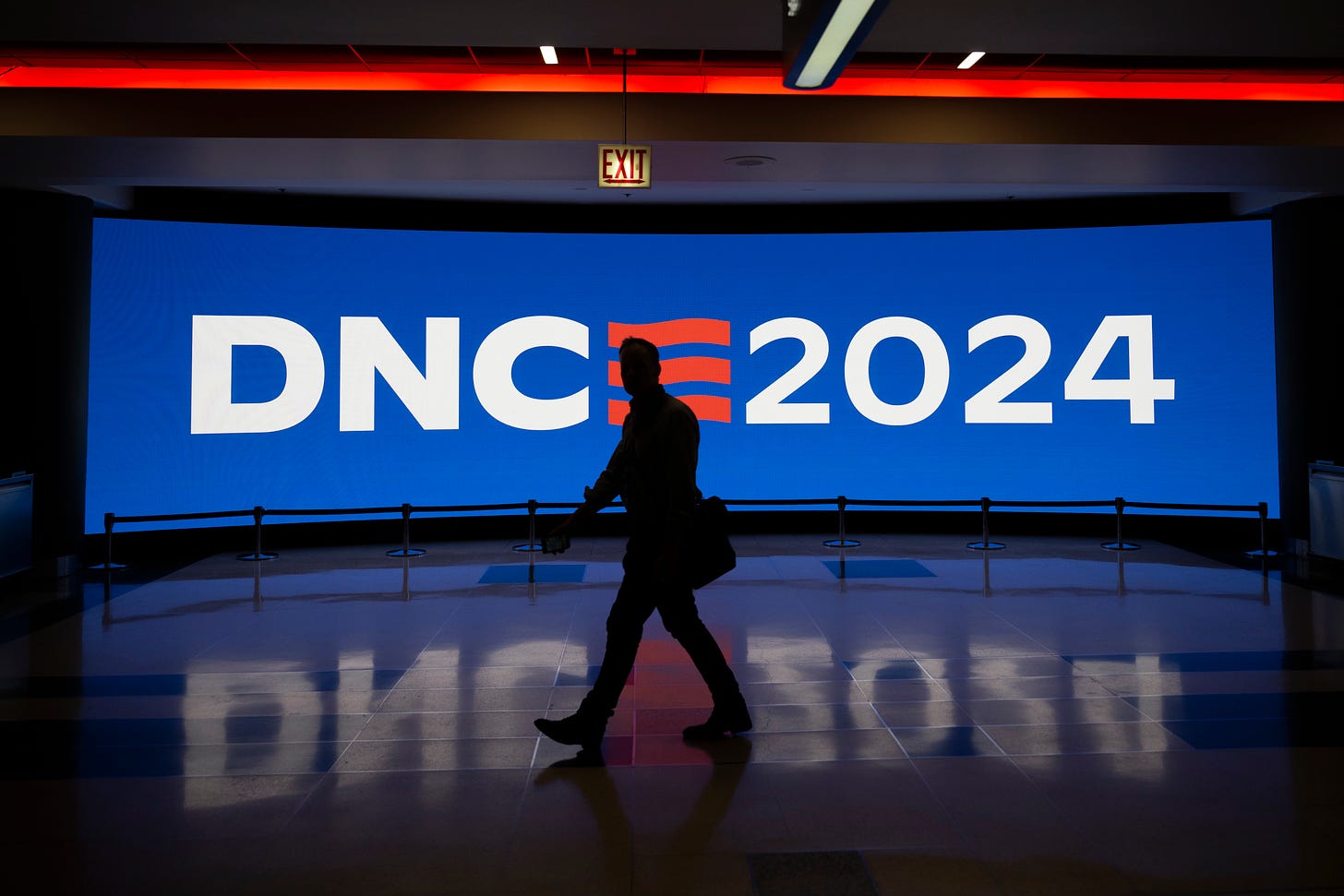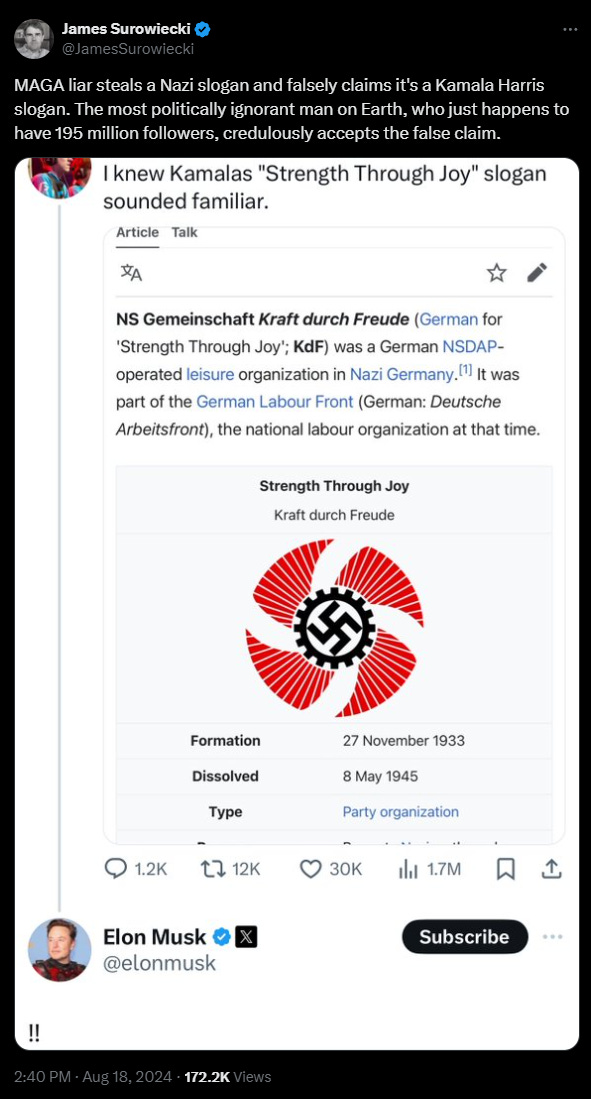Just to slow it down for a minute: Less than two months ago, Joe Biden stepped onto a debate stage next to Donald Trump and painfully demonstrated he no longer had what it would take to defeat the former president. One month ago, Biden acknowledged reality and announced he would bow out of the race, utterly changing the contest. And tonight, Biden will take the stage in Chicago to kick off the party convention to nominate his chosen successor, Kamala Harris.
Quick reminder that we’re beefing up our coverage to take it all in: Joe Perticone will be sending daily editions of Press Pass this week, and you can catch our nightly post-convention streams over on our YouTube channel. Happy Monday.

Will the DNC Make a Difference?
—William Kristol
Modern presidential nominating conventions haven’t on the whole mattered much. If one wanted to be harsh, one could even say that for all the hubbub and spectacle, each tends to bring to mind the verdict of Macbeth:
. . . but a walking shadow, a poor player,
That struts and frets his hour upon the stage,
And then is heard no more. It is a tale
Told by an idiot, full of sound and fury,
Signifying nothing.
Okay, I’ll acknowledge that’s a bit harsh to all the people who work so hard on these conventions. And the fact is that the conventions do matter sometimes. Will this year’s?
The answer to that question will come Thursday night, with the presidential nominee’s acceptance speech. I remember in 1992 laboring away on Vice President Quayle’s remarks with colleagues and the vice president himself. An old pro on the Bush team told me to relax: “The only night that really matters is Thursday night. Just don’t screw up, and no one will remember what your boss has said, or what anyone else except the president has said. The presidential nominee’s speech can make a difference. The rest? Nah.”
This Bushie said this to me with the memory of 1988 fresh in mind. Then George H.W. Bush had given a terrific acceptance speech at the convention, reintroducing himself in a compelling way to a public that had known him for a long time but not well, and deftly distinguishing himself from his boss, President Reagan, in order to carve out his own identity, while keeping Reaganites on board.
In 1992, President Bush’s speech failed to reset or reinvigorate a sputtering campaign. My Bushie acquaintance had said that Thursday night’s speech was what mattered. He was right.
So the presidential nominee’s speech is worth paying attention to, both for what it does and what it doesn’t. Kamala Harris has had a good month since taking over as the prospective nominee, beginning the introduction or reintroduction of herself to the American public. But most Americans still haven’t seen her beyond a few clips on television or social media.
Her acceptance speech will matter. It could either cap a good month and put her clearly in the lead in the race going into the home stretch, or it could fail to do so, leaving her with little momentum and vulnerable to having her early successes dissipate.
There are two other elements to consider about this convention. Unlike the beginning of the Republican convention, there’s no suspense about the vice presidential pick. That frequent element of drama is gone. Which will highlight the presidential nominee’s speech even more.
It could also allow for more focus on the mini-Biden psychodrama which will take place tonight, when the president speaks, with Vice President Harris in attendance. Can they pull off what could be a tricky handoff?
President Biden is clearly smarting from what happened a month ago. Some on this team are still complaining to the media. And a couple of days ago Biden was asked by a reporter if Harris was going to distance herself from Biden’s economic policies. Instead of ducking the question, as he should have, Biden said Harris is “not going to” do that. In fact, she has to some degree, and she probably should do more.
It would be good if Biden were at peace, or could pretend to be at peace, with what has happened, and if on Monday night he could speak briefly and non-defensively, and then leave town smoothly and gracefully, handing center stage to Harris.
But even with all that, it remains hard to see the impact of this convention lingering that long. After all, there is another date hovering in the background: September 10, 2024. That’s when Trump and Harris will (apparently) debate.
Voters will pay attention to Harris’s Thursday night speech. But they’ll really pay attention to the September 10 debate. After all, the first debate of this general election cycle, on June 27, was far and away the most consequential in American presidential history. Everyone’s going to tune in to this next one.
A good convention propelling Harris into a clear lead—or a mediocre convention that produces no momentum? Either would shape the crucial three-week campaign stretch that will culminate in the debate.
So perhaps the 2024 Democratic convention won’t be a tale signifying nothing. And, as seems more likely now than a month ago, perhaps this election will have a happier ending than Macbeth.
It Could Happen Here
Up on the site today, Austin Sarat and Dennis Aftergut shine a light on Trump’s open desire to suppress protest with the Insurrection Act—“a deeply flawed old law that has been lying around like a loaded gun waiting to be picked up by a would-be tyrant”—should he take office again:
Originally enacted in 1807 and last amended in 1871, the Insurrection Act is vaguely worded, allowing presidents to send the army or the national guard into a state “whenever the President considers that unlawful obstructions . . . or assemblages, or rebellion against the authority of the United States, make it impracticable to enforce the laws.” It creates an exception to another law, the Posse Comitatus Act, “that generally bars federal military personnel from participating in civilian law enforcement.”
More than once during his administration, Donald Trump sought to invoke the Insurrection Act. He reportedly expressed an interest in using the military to stop the violent protests that followed the murder of George Floyd at the hands of police in Minnesota, something he was urged to do by Arkansas Sen. Tom Cotton. White House aides reportedly even prepared an executive order invoking the Insurrection Act for the use of troops to march on the streets of Washington, D.C. At the time, Secretary of Defense Mark Esper and Gen. Mark Milley, chairman of the Joint Chiefs of Staff, apparently stopped Trump from doing so.
But that was then.
Do not think for a moment that because we and the Constitution narrowly managed to survive a first Trump administration that our freedom would survive a second. Indeed, Esper warned last year that Trump would invoke the Insurrection Act right after his inauguration in January 2025.
Over at Protect Democracy, our old friend Amanda Carpenter has just launched a new series digging into the other concrete ways Trump has openly strategized to overcome checks on his power. “Don’t assume that mechanisms meant to restrain the president—Congress, the courts, the nonpartisan civil service, and our ability to vote in free and fair elections—will hold the second time around.”
Quick Hits
ANOTHER ONE: The polling hits keep coming for Kamala Harris. The latest New York Times/Siena poll, released this weekend, found Harris in strong position to contend in four sun belt states: up five points on Trump in Arizona, up two in North Carolina, down one in Nevada, and down four in Georgia. “A dead heat across the Sun Belt . . . is a big deal today,” data maven Nate Cohn writes in the Times. “It represents a huge shift from earlier in the cycle, when Mr. Trump’s relative strength over Mr. Biden among young, Black and Hispanic voters had propelled him to a surprising lead across these relatively young and diverse states.”
Meanwhile, the latest ABC News/WaPo/Ipsos poll highlights just how dramatically perceptions of the race have shifted. Back in July, the same poll asked respondents whether a series of statements applied more to Donald Trump or to Joe Biden. By a 31-point margin, voters polled then said it was Trump rather than Biden who seemed healthy enough physically “to serve effectively as president.” Similarly, Trump beat Biden by 30 points among voters asked which man “has the mental sharpness it takes to serve effectively as president.”
The jaw-dropping swing in the same poll now: Harris now beats Trump by 30 points on the first question and by nine points on the second.
HARSHING THE VIBES: It won’t all be good times in Chicago this week. Tens of thousands of pro-Palestinian protesters are planning to gather outside the convention grounds to protest the Biden administration’s ongoing support for Israel in its war against Hamas in Gaza, while one group, Delegates Against Genocide, plans to try to force a debate on the war on the convention floor. “They want the convention to go smoothly—they don’t want to have any kind of disruption or any kind of statement or anything like that,” one delegate told Reuters yesterday. “I’m sorry. A convention is a political engagement vehicle, okay? And if we’re not using it for that, then it’s just a beauty pageant.”
SPAGHETTI MEETS WALL: Trump and friends’ latest strategy to try to blunt Kamalamentum: taking anodyne remarks and pretending they’re jaw-dropping demonstrations of intellectual idiocy. The list of targets include her pronunciation of “gouge,” the fairly unremarkable observation she made that democracy can be both powerful and fragile, and a response she gave as to how she’d pay for an expanded child tax credit.
The reaction to that last answer, in particular, was illustrative of the right’s current kitchen-sink approach. Harris’s response was only remarkable in that she borrowed a classic GOP talking point: that the expanded child tax credit would pay for itself by increasing generational wealth and expanding the tax pool. If that’s now considered incoherent, well, we look forward to the debate around extending the Trump-era tax cuts.







Those protestors should be doing everything they can to elect Harris because I’m pretty sure Trump would let Israel carpet bomb the entire region.
People are comparing Harris’ momentum to Obama’s in 2008. But this is different and more intense. People know that the stakes are greater now. Obama was running against McCain, who was a conservative and a very decent person. The symbolism of America having a Black president was great. The Harris candidacy is much less about her being a woman or Black than it is about having a competent, smart, honest, capable person as president. The contrast between her and a furious, hateful, intellectually limited Trump could not be greater. Everyone suspected that Biden would lose and the world would suffer. Now, we realize there is a strong movement that will change the direction of the entire 21st century. Either Harris wins or we go into 50 years of the dark ages. The momentum needs to carry us through.